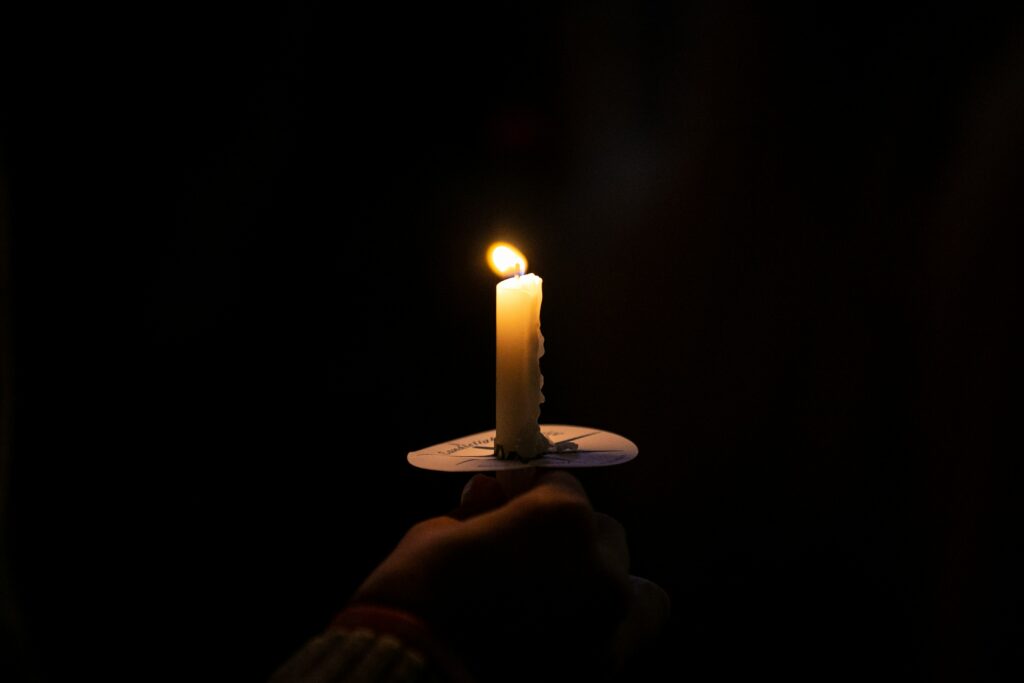Father Chet, February 1979
Two of greatest mystics, St. John of the Cross and St. Teresa of Avila, both speak of the Dark Night of the Soul: that feeling of being abandoned by God. Such a time may bring a conviction that God is far away, and we have lost our way on the spiritual journey.
This often follows some beautiful spiritual experience like a meaningful retreat. After discovering a sense of clarity of the reality and presence of God, one is inclined to imagine that this new understanding means never going back to the dull days of the past. Yet typically the feeling of closeness to God fades. We struggle to keep even a small spark of the fire that tilled the soul.
Only a person who has felt the friendship and intimacy of God can experience the pain and agony of the absence of God.
Only the person who loves deeply, or is deeply loved, knows what the absence of the beloved really means.
The writer of the Old Testament book, Song of Songs, expresses it this way: “On my bed at night I sought him whom my heart loves. I sought him but I did not find him. I will rise and go about the city… I will seek him whom my heart loves. I sought him but I did not find him” (3:l-2).
An Impenetrable Wall
The despair of such a Dark Night is that we imagine ourselves to be standing before an impenetrable wall.
We are certain that we will never progress any further. We feel we are making a long journey through a trackless desert and imagine we are alone and lost without even the comfort of knowing that God is with us.
This is the time when we are challenged by God to make the leap of faith:
- to believe even when there seems to be nothing in which to believe;
- to trust and to hope when all seems lost and hopeless;
- to give ourselves in love to an unknown God who keeps hiding himself and makes no apparent effort to show any return of love to us.
Standing in Openness
The only recourse in this Dark Night is to stand firm on our ground of faith in God, even if he seems to be absent. With Job we must say: “Though he slay me, I will wait for him” (Job 13:15). We must cry out, “Lord Jesus Christ, son of God, have mercy on me, a sinner,” using this Jesus Prayer as a mantra from the depths of our being.
We must place ourselves in simple openness to God’s mercy, allow ourselves to be turned inside out and rendered absolutely helpless before God’s power and grace.
We may say with Saint Ignatius: “Lord, take into your hands my entire liberty, receive my memory, my understanding, my whole will. All that I am, all that I have, you have given to me. I give it back to you to be disposed of’ according to your great pleasure. Give me only your love and your grace, with these I am rich enough and desire nothing more.”
Light Follows the Dark Night
Actually, the soul is being called to experience God in a new kind of way, no longer experiencing him through feelings or images, but now nakedly through blind faith.
This darkness can achieve what years of study cannot.
Our faith grows as we realize that God is absolute mystery, the great Unknowable, yet absolutely real. Thus, we find ourselves entering into a new kind of prayer, a prayer without images or feelings, whereby we proceed to God rather by unknowing than knowing.
This is the beginning of the unitive way, the way of passive contemplation. It is where we do apparently nothing, but where God does whatever he wills with us. The only road to this new kind of prayer is the road of the Dark Night through the deep valley of loneliness as we blindly trust and follow the Lord.
Darkness leads to the mountain top where God, the Dawn of a New Day, is discovered.
Moving Toward God
The Dark Night is not only a phase but also a symbol of the entire process of our moving toward God. The Dark Night is part of the necessary dying to self that must be accomplished in order to make room for a total dependence upon God.
Our Lord speaks of it as a pruning of not only the dead branches but also the excess branches that are inclined to spring up wildly and uncontrolled. “My Father is the vine dresser. He prunes away every barren branch and the fruitful ones he trims clean to increase their yield” (John 15:1-2).
The Dark Night can also be the condition of “Kenosis” (purgation) for us. We empty ourselves of every urge for power and importance, and of all concentration on self, deciding to give up all for the presence of God.
Total Surrender
We must be willing to give God our most precious possession: our inner being. In other words, our very self.
God then becomes the center of our life and of all reality; God, not the world, possesses us. Once this total surrender of self to God is made, we are resolved to seek nothing and do nothing that is not willed by God.
A Journey of Purification
In the meantime, between our first adult turning to God and the full maturity of union with God, there will always be a long Dark Night of the Soul that resembles a journey through a dark tunnel without any vision of light even in the distance.

Purifying ourselves of selfishness is a task cannot be merely willing it to be gone. It is dependent on God’s mercy and often we must wait patiently for that divine mercy to manifest itself.
Sometimes we may wait for years. In the meantime, we must try to reorder our goals and priorities to fit into those of the Gospel, that of Jesus and his teachings.
Such reordering does not occur without pain. Only through failures and mistakes, falls and even sins, and with much patience, are we capable of making the total gift of self to God that is required. There is no other road from the mountain of pride to the mount of perfection except through the dark valley of humiliation.
God is Present in the Dark Night
This gift of self must be made over and over again and is seldom, if ever, perfected by one lone decision – as for example one made during a retreat weekend. Again and again, our decision for Christ is to be renewed, deepened, and extended as God reveals what needs to be changed in our lives.
The Dark Night can also be seen as a negative way of experiencing God. St. Teresa of Avila experienced the Dark Night for approximately eighteen years of her adult life. At the end of this period, our Lord appeared to her in a vision. Teresa asked: “Where have you been all these years?” Jesus replied: “I was closer to you then than I am now.”
Three Evolving Phases
Traditionally, spiritual writers have divided the spiritual journey into three phases: the purgative, illuminative, and unitive. We have considered the purgative way in the preceding paragraphs.
The illuminative way is the experience of light or insight into God and the things of God. The unitive way is the experience of union with God, whereby the reality of his presence becomes so great that we seem to be one with him or totally immersed in him.
The three-fold division does not mean that we must finish all the tasks of the purgative way before experiencing the illuminative or unitive way. Rather, our life is like a piece of cork bobbing up and down on the waves.
Throughout our adult life we can expect to experience snatches of all three ways. Any peak spiritual experience, even in adolescence, may be considered a taste of the illuminative or even the unitive way. But once the realization fades away, we can expect a further purgation of our pride and selfishness by a new experience of the Dark Night.
All of life alternates between these three points of growth.
Hope in Even the Dark Night
Paul vividly describes the tensions—and promises—in the spiritual journey:
“[The Lord] said to me, ‘My grace is sufficient for you, for my power is made perfect in weakness.’ I will all the more gladly boast of my weaknesses, that the power of Christ may rest upon me. For the sake of Christ, then, I am content with weaknesses, insults, hardships, persecutions, and calamities; for when I am weak, then I am strong.” (II Cor 12:9-10)
The Old Testament Song of Songs also captures the highs and lows of our spiritual life: “Arise, my love, my beautiful one and come. For behold, the winter is past, the rains are over and gone. The flowers have appeared in the land, the time of pruning has come, the song of’ the turtle dove is heard in the land” (Song of Songs 2:10-ll).
Editor’s Note: This is the first of three installments of Fathers Chet’s writings on the Dark Night. The subsequent reflections will continue in April and June.



2 Replies to “The Dark Night: Feeling Lost and Abandoned”
Comments are closed.